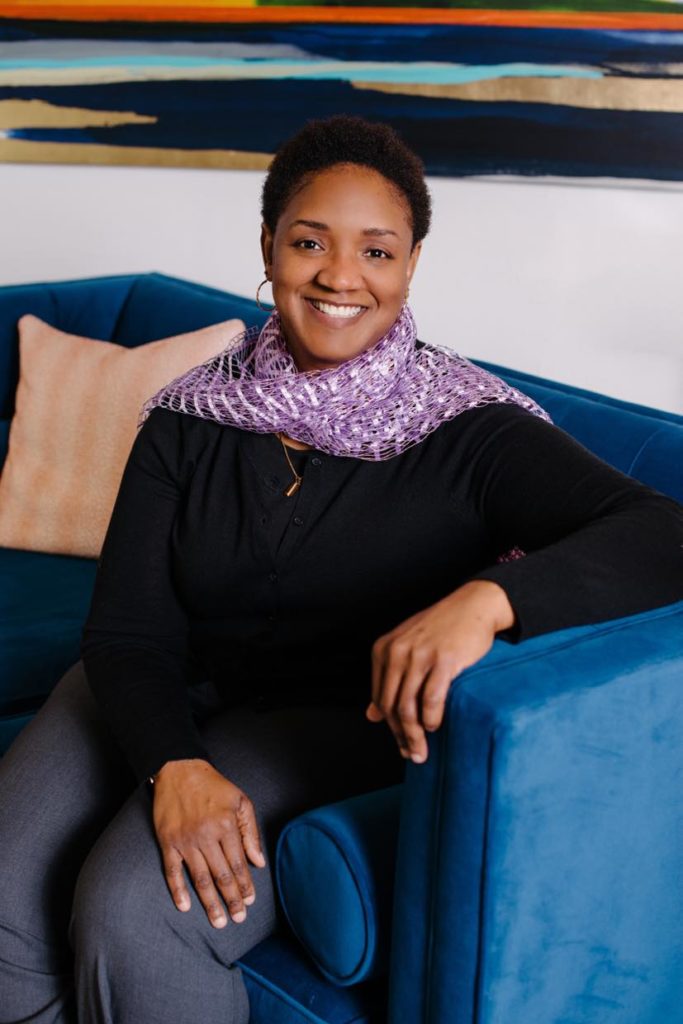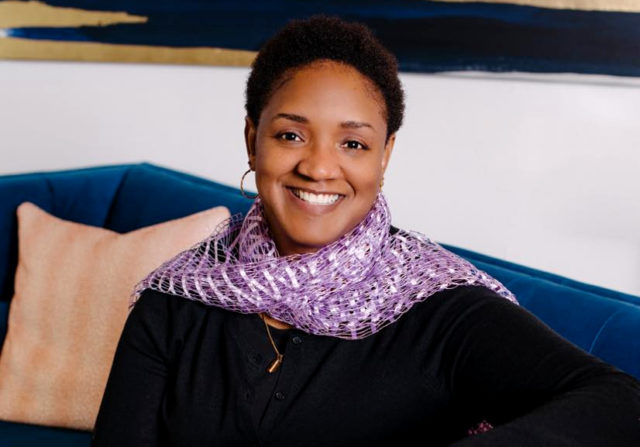“I am really looking forward to continuing conversations that we’ve been having around the state around transformational justice and dismantling white supremacy and what it all means and how it could look in our organizations,” says Monique Minkens, the new executive director of End Domestic Abuse Wisconsin. “I think about how this [anti-domsetic violence] movement is steeped in the white feminist movement which means that a lot of people have been left out. I think that we’re trying to broaden our horizons and broaden our view in how we serve clients knowing that when everything was set up, it didn’t have everyone in mind.”
End Domestic Abuse Wisconsin is a statewide agency that has a vision of “eliminating violence against women, oppression, and the circumstances that contribute to any person across the lifespan living in fear within their families, intimate relationships, or in caregiving relationships.” Minkens, who started her new role last week, has been part of the anti-domestic violence movement for quite some time.
“Before I joined the movement, domestic violence touched my family, so it’s something that has always been a part of me,” Minkens tells Madison365. “And when I joined the movement, I moved up through the ranks and progressed with different experiences.
“What I like about being here at End Abuse is that as a state coalition we get to educate and inform the different programs around the state about what we are learning and what trends they are seeing and to give them tools to address the needs of the people they serve,” she adds.
End Domestic Abuse Wisconsin, according to its website, educates shelter and program volunteers and advocates, law enforcement, legislators, and community members to provide safety and support to survivors. Minkens had been the director of coalition programs at End Abuse before she became executive director. Prior to that, Minkens was program capacity and support coordinator for the organization and the director of residential services for DAIS (Domestic Abuse Intervention Services).
According to the CDC, 1 in 4 women and 1 in 7 men will experience physical violence by their intimate partner at some point during their lifetimes. Minkens says that she wants to give voice to all affected by domestic abuse, especially those who are most marginalized. Unfortunately, one of the big issues in domestic abuse is that a person is often financially tied to or dependent on the abuser.
“I can recall when I worked at a DV[domestic violence] shelter — I worked at DAIS downtown – when it was time for clients to exit shelter, we would see many people come back,” Minkens says. “And they came back because when they went to the people that were making them feel unsafe and they had no alternative. So they would come to the shelter to catch a break or with the intention of leaving if they could. But it’s really expensive to live in Madison. It’s really expensive to go out on your own or to rebuild yourself.
“I think about how programs are working sometimes and they get stuck in their bubble because they are trying to take care of their organization and sometimes they get tunnel vision,” she adds. “And we have this bird’s eye view that allows us to look at trends, look at what’s new out there and we hear a collective of stories and gather a collective of information that allows us to encourage change based upon the information that we receive.”
Minkens says she hopes to “facilitate the dismantling of white supremacy in the anti-violence movement” and create a movement that serves all individuals who seek support and liberation.
“When you think about, for example, that there is a Missing Murdered Indigenous Women Task Force. For me, that’s an indicator that the Native population was not included and they were not in mind when VAWA (Violence Against Women Act) was created,” she says. “I’m thinking about the fact that some of us talk about VAWA being more like a crime bill instead of a social service bill. So, communities of color aren’t excited about somebody calling the police to save them when it can be very traumatizing for them.
“We need to have conversations about how we can serve the person with most barriers. A person who has not only generational trauma and family trauma but historical trauma. The person that has been left out,” she continues. “I’m looking forward to having those conversations. I know that these will be uncomfortable conversations to have, but change only comes when we get uncomfortable and have those conversations. I’m excited to continue to do that.”
Once upon a time, openly talking about domestic violence used to be really taboo. Since the Violence Against Women Act was signed in 1994 by President Clinton almost three decades ago, are people able to talk about abuse more openly and candidly?
“It depends. I will say that people do talk about it but they don’t name it. I can see a newspaper article that talks about a dispute in a family and I’m like, ‘This is domestic violence!’ I see those often,” Minkens says. “I think that people are talking about domestic violence more but kind of in a peripheral way and I don’t really hear people name it the way that they could.”

(Photo by Hillary L. Schave,
Azena Photography)
With personal movement limited and people confined to their homes over the past year-plus, domestic violence was, unfortunately, a pandemic within a pandemic.
“You see that DV [domestice violence] rose considerably across the country and around the world during the pandemic. We thought that ‘Safe at Home’ was making everybody safe, but everybody wasn’t safe,” Minkens says. “People are aware of it and it’s not always on our radar and because of that, we can’t always name it. There’s still shame that goes along with it. There’s still attitudes about domestic violence and how maybe it’s a family issue. I feel like there has been some progress made, but we still have a long way to go.”
Minkens, who earned a bachelor’s degree of arts in history and communications from Mount Mary University and a master of science in Guidance and Counseling from the University of Wisconsin-Whitewater, is eager to make connections in her new role.
“My goal is to make sure that we are serving the last survivor and that we have everything in alignment – our services are in alignment with the people we serve, the laws and policies are in alignment so people can thrive and people can be liberated …. So people can liberate themselves,” Minkens says. “It’s not for us to save them; it’s for us to connect them to those tools that will help them to liberate themselves.
“And I look forward to that day, “ she adds.




























